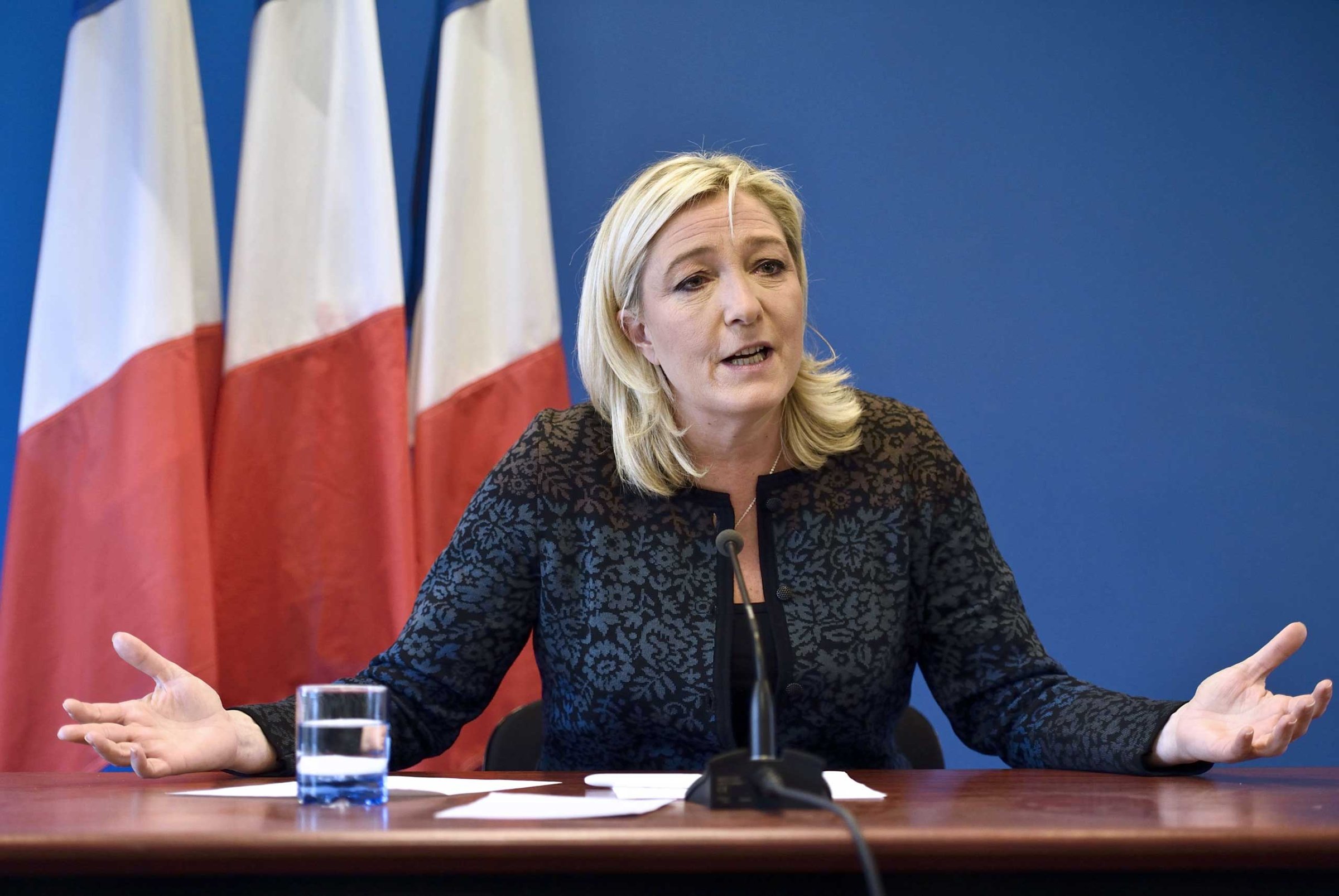
Is Russian President Vladimir Putin meddling in the internal politics of countries in the European Union? That seemed a strong possibility to some Europeans this week, after French political leader Marine Le Pen confirmed she had secured a €9-million ($11.1 million) loan from a Moscow-based bank, in order to run her right-wing National Front party.
“At this stage, Russia is trying to influence French domestic policy,” says Jean-Yves Camus, a political researcher at France’s Institute of International and Strategic Relations (IRIS). If so, Putin’s strategy resembles the Soviet Union before its collapse in 1991, when Moscow funded trade unions and political groups in western Europe in an attempt to buy influence and destabilize foes. “In this respect Putin is pretty much in line with the former USSR. It is the same policy all over again,” says Camus.
The French investigative news site Mediapart first broke the news that the National Front had taken the loan, with a 6% interest rate, from First Czech Russian Bank, a small Moscow-based institution, the chairman of which is Roman Popov. Mediapart said the deal emerged partly as a result of Le Pen’s visit to Moscow last February, where she met Alexander Babakov, a Russian lawmaker with connections to Putin. Babakov, who owns businesses in Ukraine, was placed under E.U. sanctions in April in retaliation for Putin annexing Crimea from Ukraine.
Well before Le Pen’s political prospects rocketed this year — the National Front won a string of victories in municipal elections in March and polled top among French voters in E.U. elections in May — the Front’s president threw her energies into cultivating allies beyond the borders of France. She traveled to Moscow in June, 2013, and met with the Speaker of the State Duma, Sergei Naryshkin and deputy Prime Minister Dmitry Rogozin, who hailed her as a politician of stature. She made a return trip shortly before the E.U. elections.
The trips appear to have paid dividends. A key Le Pen aide told TIME on Tuesday that the Russian loan was desperately needed since the party was close to broke after investing heavily in its election success.”It has been a real struggle,” says Ludovic de Danne, senior E.U. advisor to Le Pen, speaking from the European Parliament in Strasbourg, France. He says Front officials have spent months trying to borrow money, tapping their supporters in countries around the world in an attempt to shake loose funds in order to run their operations. “Banks did not want to lend to us,” he says, adding that those who rejected them included “really, really big American institutions.”
Le Pen has been a staunch supporter of Russia. For months she has lambasted the E.U. for its sanctions against it, and she told Naryshkin in Moscow last year that Europe’s “Cold War on Russia” was “not in line with traditional, friendly relations nor with the economic interests of our country.”
Le Pen — whose party is similar to populist movements like the United Kingdom Independent Party (UKIP) and the Alternative for Germany — aims to pull her country out of the Union and reclaim its sovereignty over border control and fiscal budgets. As Putin fights to keep Ukraine and other countries allied to Russia, anything that weakens the 28-country E.U. could help further that cause.
The far-right parties in Europe share certain ideological opinions with Putin including opposition to gay marriage and open immigration. UKIP leader Nigel Farage earlier this year said Putin was one of the world leaders he most admired.The National Front aims to dismantle the E.U. and replace it with a European coalition of sovereign states that would include Russia, rather than a union that hues to U.S. values and policies, as Le Pen claims. “Russia should be a privileged partner in Europe,” de Danne says. “We don’t see Russia in 2014 as an enemy, we see Russia as a European country. And we want a multipolar world.”
Even so, some believe Putin might be misjudging the potential for right-wing leaders in Europe to take control of their governments. “In practical terms the far-right parties are of little help to him as they hold no power,” says Cas Mudde, associate professor in the School of Public and International Affairs at the University of Georgia. Similarly, Camus believes that Putin could be further isolated if Le Pen fails to become French president. “This strategy can backfire,” he says. “Putin is pretty much isolated in the international community. So I think he doesn’t have anything to gain by supporting or helping the extreme right.”
By contrast, Le Pen has already gained something valuable — a loan to support her party finances. Still, her aide de Danne denies that the loan will lead to Russian influence on the group. “It is not the agenda of Marine to get her orders from Moscow, not at all,” he says. “We had no choice. If a European bank says we’ll give you money, we will switch tomorrow.”
More Must-Reads from TIME
- Cybersecurity Experts Are Sounding the Alarm on DOGE
- Meet the 2025 Women of the Year
- The Harsh Truth About Disability Inclusion
- Why Do More Young Adults Have Cancer?
- Colman Domingo Leads With Radical Love
- How to Get Better at Doing Things Alone
- Michelle Zauner Stares Down the Darkness
Contact us at letters@time.com